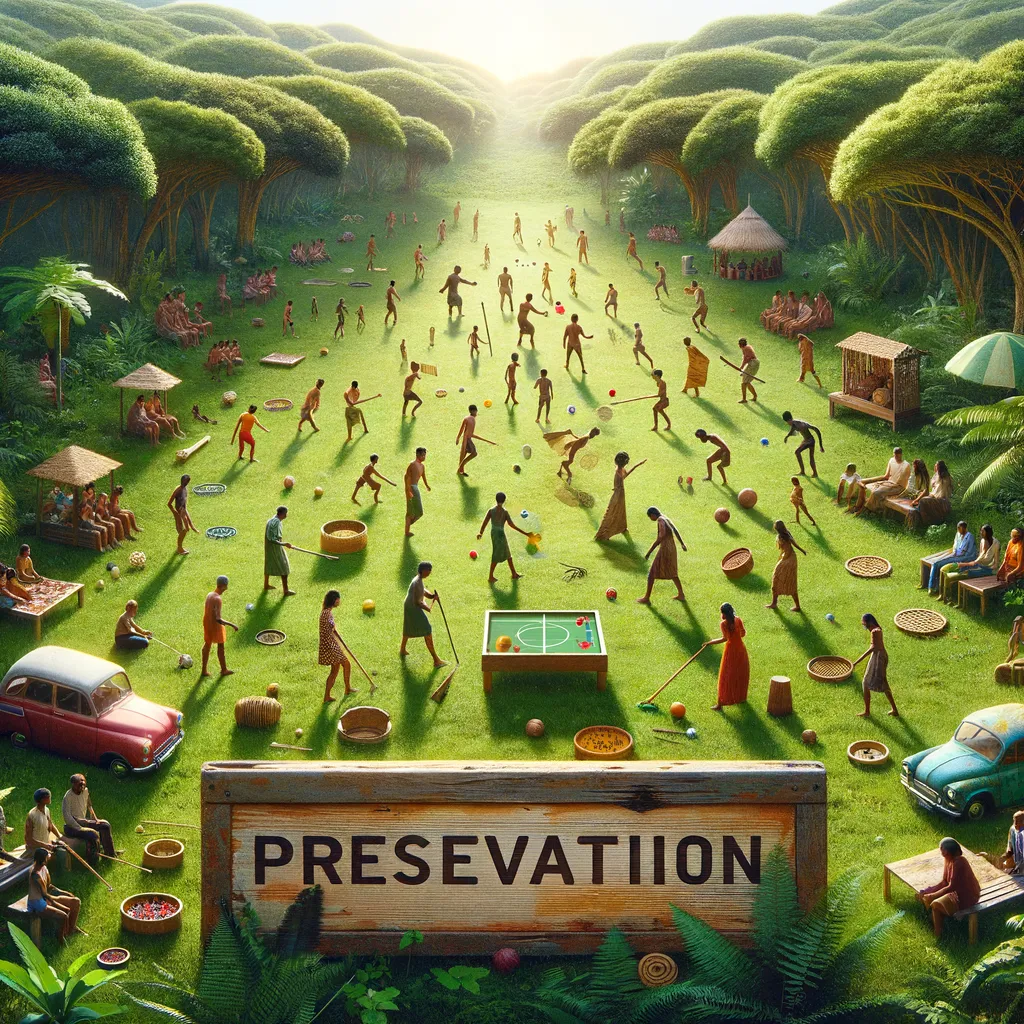Reviving Tradition: Preserving Indigenous Outdoor Games for Future Generations
Welcome to our comprehensive guide on preserving indigenous outdoor games! As parents and guardians, it’s vital we pass on the rich heritage of traditional outdoor games to our children. Not only do these games offer unparalleled fun and excitement, but they also hold the essence of cultural history, teaching valuable lessons on community, teamwork, and respect for nature. In an age where digital entertainment often prevails, reintroducing these gems can provide a fresh breath of revitalizing Outdoor Activities that brings families closer together.
In this guide, we’ll explore the significance of these indigenous games, why they matter, and how you can easily integrate them into your family’s outdoor adventures. From the Americas to the far reaches of Oceania, every culture boasts its unique set of outdoor games. By incorporating these activities into your routine, you’re not just offering your children a slice of history; you’re gifting them with a deeper connection to the outdoors and a fantastic way to stay active and healthy.
Before diving into the captivating world of indigenous games, ensure you have all the necessities for a day full of adventure and learning. Visiting Camping supplies might be a perfect start to gather all the essential gear for your outdoor gaming experience. Whether you’re playing in your backyard, a local park, or during a camping trip, preparation is key.
Why Preserving Indigenous Games Matters
Indigenous outdoor games are more than mere pastimes. They embody the traditions, values, and stories of a culture. These games teach us about cooperation, endurance, strategy, and respect for the competitor and the environment. In a world that’s rapidly moving towards globalization, these games serve as a reminder of our diverse human heritage and the importance of preserving it for future generations.
Furthermore, engaging in such games encourages physical activity and mental well-being. In a time when screens often dominate leisure activities, traditional outdoor games offer a much-needed antidote. They motivate children to move, think, strategize, and interact with others face-to-face, fostering a sense of community and belonging.
Additionally, teaching these games to our children is an act of cultural preservation. As languages disappear and traditions fade, every game saved from oblivion is a victory. It’s about keeping the flame of ancestral wisdom alive, allowing it to illuminate the path for future generations.
Integrating Indigenous Games into Modern Family Life
Reviving these ancient traditions in today’s world might seem like a daunting task, but it’s easier than you think. Start by selecting a few games that resonate with your family’s interests or heritage. Research the rules, the cultural significance, and any required equipment. Then, dedicate some time each week to learning and playing these games together.
It’s also a fantastic opportunity to connect with your local community or indigenous groups. Many communities are more than willing to share their traditional games and stories. This interaction not only enriches your family’s experience but also fosters a deeper respect and understanding for local cultures.
Moreover, integrating these games into regular family outings, such as hikes, picnics, or camping trips, can make the experience even more enjoyable. Imagine playing a traditional game of tag in the woods or a native ball game by the lake. These activities not only add excitement to your outings but also allow you to enjoy the beauty of nature while connecting with each other on a deeper level.
Remember, the goal is not to achieve perfection in playing these games but to enjoy the process of learning and bonding. Whether it’s through laughter, competition, or shared curiosity, preserving indigenous outdoor games is a journey worth taking for every family.
Reviving Tradition: Preserving Indigenous Outdoor Games for Future Generations
Welcome to our in-depth guide on preserving indigenous outdoor games! As parents and guardians, it’s vital we pass on the rich heritage of traditional outdoor games to our children. Not only do these games offer unparalleled fun and excitement, but they also hold the essence of cultural history, teaching valuable lessons on community, teamwork, and respect for nature. In an age where digital entertainment often prevails, reintroducing these gems can provide a new layer of Outdoor Activities that brings families closer together.
This guide delves into the significance of these indigenous games, why they matter, and how you can seamlessly weave them into your family’s outdoor adventures. Spanning from the Americas to Oceania, each culture has its unique set of outdoor games. By incorporating these into your routine, you’re not just offering your children a piece of history; you’re providing them with a deeper connection to the outdoors and a fabulous way to stay active and healthy.
Ensuring you’re well-prepared for a day brimming with adventure and learning is crucial. A visit to Camping supplies can be a perfect starting point to collect all the essential gear for your outdoor gaming experience. Whether in your backyard, a local park, or during a camping trip, preparation is key.
Why Preserving Indigenous Games Matters
Indigenous outdoor games are more than mere pastimes. They embody the culture’s traditions, values, and stories. These games teach us about cooperation, endurance, strategy, and respect for the competitor and the environment. In a rapidly globalizing world, these games serve as a critical reminder of our diverse human heritage and the importance of preserving it for future generations.
Furthermore, these games promote physical activity and mental well-being. In an era dominated by screens, traditional outdoor games provide a vital counterbalance. They encourage children to move, think, strategize, and interact with others in person, fostering a sense of community and belonging.
Additionally, passing these games to our children is an act of cultural preservation. As languages and traditions face extinction, every game saved from oblivion signifies a triumph. It’s about maintaining the ancestral wisdom flame, letting it light the path for future generations.
Integrating Indigenous Games into Modern Family Life
Reviving these ancient traditions might seem challenging, but it’s simpler than it appears. Begin by selecting a few games that align with your family’s interests or heritage. Understand the rules, the cultural significance, and any required equipment. Then, commit to spending some time each week learning and playing these games together.
Connecting with your local community or indigenous groups can also enrich your family’s experience. Many communities are eager to share their traditional games and tales. This interaction not only enriches your experience but also deepens respect and understanding for local cultures.
Incorporating these games into family outings like hikes, picnics, or camping trips can enhance the experience. Visualize playing a traditional game of tag in the woods or a native ball game by the lake. These experiences add excitement to your adventures while allowing you to appreciate nature and connect on a deeper level.
Acknowledging that mastery of these games is not the goal but rather the enjoyment of learning and bonding is essential. Through laughter, competition, or shared curiosity, embarking on the journey of preserving indigenous outdoor games is worthwhile for every family.
Five Key Preparation Tips for Preserving Indigenous Outdoor Games
As you prepare to embark on this enriching journey, here are five crucial tips to ensure you’re well-equipped for preserving and enjoying indigenous outdoor games:
- Research and Select Games: Start by researching games that align with your family’s interests and cultural backgrounds. Look for games with simple rules but rich cultural significance to make the learning process enjoyable and educational.
- Gather Necessary Equipment: Many indigenous games require specific equipment or items. Ensure you have everything needed for these games, whether it’s homemade tools or natural elements like stones or sticks. Creativity in replicating game tools can also be a fun family activity!
- Learn the Cultural Background: Understanding the history and culture behind each game adds depth to the experience. Share these stories with your children to instill a sense of respect and appreciation for the culture from which the game originates.
- Practice Outdoor Safety: Safety should always be a priority, especially during any physical activity
Disclaimer
The articles available via our website provide general information only and we strongly urge readers to exercise caution and conduct their own thorough research and fact-checking. The information presented should not be taken as absolute truth, and, to the maximum extent permitted by law, we will not be held liable for any inaccuracies or errors in the content. It is essential for individuals to independently verify and validate the information before making any decisions or taking any actions based on the articles.





